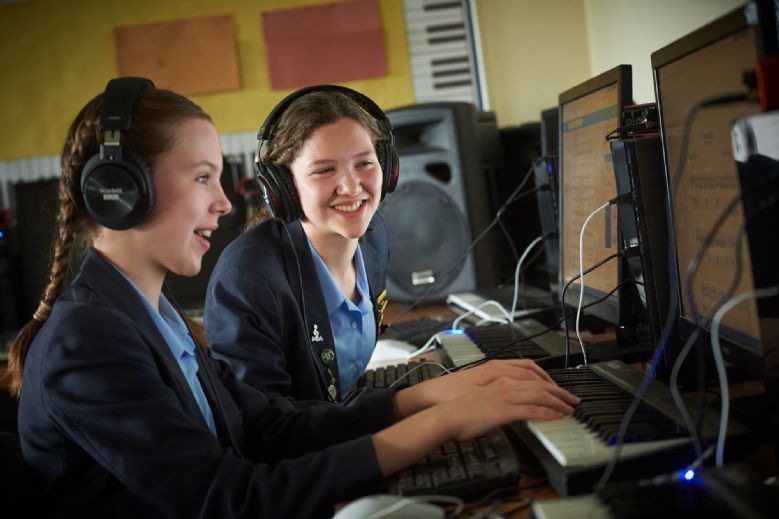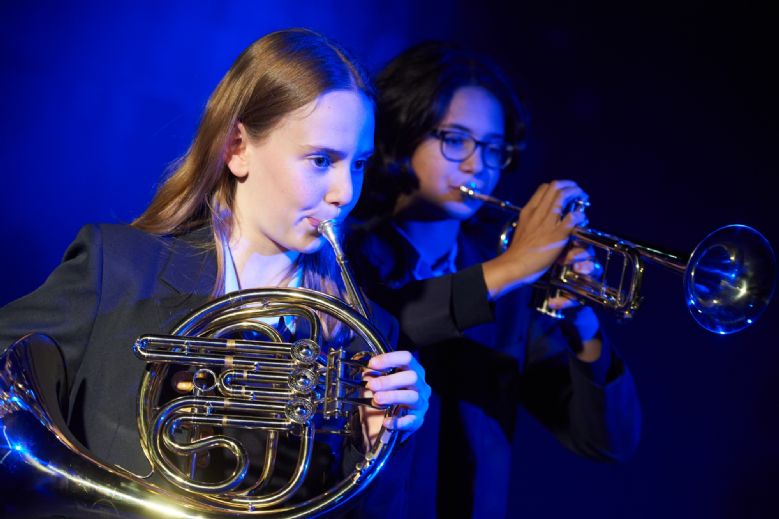Music
| Curriculum Intent and Overview |
|---|
| Our curriculum aims to produce learners who are self-confident to perform, creative composers and curious to learn about a range of musical styles. Pupils will develop their technique to perform on different instruments, both on their own and as an ensemble. They will learn how to improvise, develop and refine their own musical ideas. Pupils are encouraged to become active listeners who are interested and driven to discover more about the world of Music. Key concepts and skills needed for A level and GCSE are fed down into schemes of work from Year 7 upwards. This ensures all learners engage with a broad and interesting curriculum that also equips them for study beyond Year 9. In addition, students are encouraged to explore their own musical interests, expanding and challenging their musical horizons through a rich co-curricular timetable. |
|
|
The Department
Curriculum Leader: Mrs T Cooper
Music is taught to all students in Years 7 to 9 and covers a wide range of styles from around the globe and from various points in history – building upon the skills of performance, composition and analysis we are able to explore music from ABBA, to midi sequencing, through to Hans Zimmer.
 We continue this musical journey by offering music at both GCSE and A level as well as our team of visiting music teachers from Hertfordshire Music Service offering ABRSM and Trinity examinations specific to students’ instruments. The Music Department hosts a team of highly experienced visiting peripatetic teachers, teaching a range of instruments on an individual basis. These are highly popular and a significant percentage of students undertake such individual instrumental lessons.
We continue this musical journey by offering music at both GCSE and A level as well as our team of visiting music teachers from Hertfordshire Music Service offering ABRSM and Trinity examinations specific to students’ instruments. The Music Department hosts a team of highly experienced visiting peripatetic teachers, teaching a range of instruments on an individual basis. These are highly popular and a significant percentage of students undertake such individual instrumental lessons.
There are a range of extra-curricular activities including choirs, orchestras, songwriters clubs, sign choirs, pop and folk ensembles, string and wind chamber ensembles and many more. These clubs meet regularly at lunchtimes and after school and perform in regular concerts, recitals and showcases held at the school.
KS3
What will be studied?
Year 7
- Discover your Voice
- Descriptive Music
- West African Drumming
- Instruments of the Orchestra
- Keyboard Skills
- Musical Theatre
Year 8
- The Blues
- Folk Music
- Heroes and Villains: Leitmotifs
- Sequencing Skills
- Rap
- Songwriting
Year 9
In Year 9 we want to promote more student autonomy and responsibility. Students learn as part of a carousel and cover the following areas:

- Reggae performance and songwriting
- 1970s holistic project
- Introduction to notation and sequencing software to transcribe and compose
- Power Ballads: analysis and performance
What support is needed?
- Encourage a wide appreciation of a range of music
- Support to learn an instrument privately
- Practice at home
- Join an extra-curricular club
How will they be assessed?
- Regular listening tasks
- Solo and group performance
- Solo and group composition
GCSE
Exam Board: Eduqas
Specification Number: 601/8131/X
Course Content
Unit 1: Performance
A portfolio of performances, usually consisting of:
- One solo performance
- One ensemble performance
Unit 2: Composition
Two compositions (coursework) of approximately two minutes each
Unit 3: Listening & appraising examination (1hr 15 mins) based on listening extracts from set works from the following areas of study:
- Musical Forms and devices - including a set work of Bach’s Badinerie
- Music for Ensemble
- Film Music
- Popular Music - including a set work of Toto’s Africa
How will they be assessed?
Coursework is marked both on an interim and then, at the end of the course, a final basis. Other informal assessments take place throughout the course. Students will complete analysis questions and homework throughout the year to check their understanding of the Set Works. There is a final Listening examination at the end of the course based on listening extracts. Performance is examined through a final privately recorded performance of a solo and ensemble piece, or two ensemble pieces.
- Performing coursework = 30%
- Composition coursework = 30%
- Listening exam = 40%
A Level
Exam Board: Eduqas
Specification Number: 601/8146/1
Course Content
Unit 1: Performance
- A recital of two (25% of final grade) or three (35% of final grade) pieces on their chosen instruments. One of the pieces in the 25% option, and two of the pieces in the 35% option must link to an Area of Study. The recital should be of between 6 and 8 minutes for the 25% option, and 10 and 12 minutes for the 35% option at a minimum standard of Grade VI.
Unit 2: Composition
- A choice of two (25% of final mark) or three compositions (35% of final mark). Depending on the option, one or two of these will be in relation to a brief set by the board, and the second or third will be a free choice.
- Total time for the 25% option would be 4-6 minutes, and for the 35% option, 8-10 minutes.
Unit 3: Students sit a 2 hour written paper ‘Appraising’
- Knowledge and understanding of musical elements, contexts and language will be explored through the study of set works that fall into the following categories; The Western Classical Tradition, one of Rock & Pop, Musical Theatre or Jazz and one of Twentieth Century Music, or Music into the Twenty-First Century.
- At present, students focus on The Western Classical Symphony, Musical Theatre, and Music into the Twentieth Century as the allotted areas of focus for A level.
- Students will also be required to apply this knowledge to unfamiliar works.
Assessment:
A combination of learning methods will be employed – ranging from research lessons, teacher and student led score analysis, practical performance, individual composition time and listening and harmonic exercises.
Why Music at St Albans Girls’ School?
We have a well resourced music department with 5 practice rooms which can be booked for individual or group rehearsals. We have 3 music classrooms, one of which has 20 computers equipped with Sibelius and Ableton. We have a team of visiting peripatetic teachers who offer individual tuition on most orchestral and rock/pop instruments, and a large number of ensembles which are open to all A-level students to join, including Senior Orchestra, Wind Band, Chamber Strings, Flute Choir, Chamber Choir, Songwriters Club, and opportunities to run and take a lead on musical extra-curricular activities themselves.
Expectations of students:
To regularly attend peripatetic music lessons and to participate in at least one extra-curricular Music club, set preparation to be completed as well as background reading and listening around the historical context of set works. Regular instrumental practice must be undertaken.
What websites are recommended?
What equipment is needed?
Your instrument
Access to repertoire for your instrument (your sheet music)
Manuscript paper
Writing paper
Basic stationery
Folder with dividers
Career Paths:
As music combines well with both arts and sciences, a range of careers are possible. However, direct musical careers may be in performance, composition, workshop leading, education, publishing, arts administration and management, computer technology, theatre and music therapy.